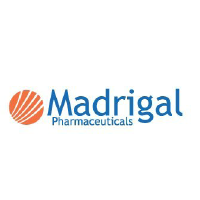
Madrigal Pharmaceuticals Inc is a clinical-stage biopharmaceutical company. It focuses on the development and commercialization of therapeutic candidates for the treatment of cardiovascular-metabolic diseases and non-alcoholic steatohepatitis (NASH). The product portfolio of the company includes MGL... Madrigal Pharmaceuticals Inc is a clinical-stage biopharmaceutical company. It focuses on the development and commercialization of therapeutic candidates for the treatment of cardiovascular-metabolic diseases and non-alcoholic steatohepatitis (NASH). The product portfolio of the company includes MGL-3196, an orally administered, small-molecule liver-directed B-selective THR agonist, which is used for the treatment of non-alcoholic steatohepatitis and familial hypercholesterolemia. Also, MGL-3196 reduces triglycerides in the plasma and liver by increasing fat metabolism and shows an anti-diabetic action. 詳細を表示
| 期間 † | 前日比 | 前日比 % | 始値 | 高値 | 安値 | 平均出来高 | VWAP | |
|---|---|---|---|---|---|---|---|---|
| 1 | -5.335 | -1.59494162842 | 334.495 | 350 | 299.5601 | 532200 | 329.28789994 | CS |
| 4 | -8.19 | -2.42774566474 | 337.35 | 377.46 | 299.5601 | 426441 | 336.8122834 | CS |
| 12 | 24.15 | 7.91777318776 | 305.01 | 377.46 | 266.44 | 412462 | 320.50194699 | CS |
| 26 | 91.72 | 38.6287061995 | 237.44 | 377.46 | 200.63 | 402125 | 298.86932374 | CS |
| 52 | 71.28 | 27.6407631456 | 257.88 | 377.46 | 189 | 416713 | 273.11592507 | CS |
| 156 | 232.69 | 241.20451954 | 96.47 | 377.46 | 57.1534 | 385057 | 218.84766533 | CS |
| 260 | 245.43 | 293.120745253 | 83.73 | 377.46 | 52.33 | 295063 | 191.90207928 | CS |
 TechandBio
3週前
TechandBio
3週前
 TechandBio
1月前
TechandBio
1月前
 TechandBio
8月前
TechandBio
8月前
 jchords
12月前
jchords
12月前
 makinezmoney
2年前
makinezmoney
2年前
 TechandBio
2年前
TechandBio
2年前
 TechandBio
2年前
TechandBio
2年前
 Alan Brown
2年前
Alan Brown
2年前
 makinezmoney
2年前
makinezmoney
2年前
 makinezmoney
2年前
makinezmoney
2年前
 makinezmoney
2年前
makinezmoney
2年前
 eddyimano
2年前
eddyimano
2年前
 eddyimano
2年前
eddyimano
2年前
 eddyimano
2年前
eddyimano
2年前
 makinezmoney
2年前
makinezmoney
2年前
 eddyimano
2年前
eddyimano
2年前
 makinezmoney
2年前
makinezmoney
2年前
 IOUBLOKE1
2年前
IOUBLOKE1
2年前
 makinezmoney
2年前
makinezmoney
2年前
 IOUBLOKE1
2年前
IOUBLOKE1
2年前
 Brokemillwright
3年前
Brokemillwright
3年前
 roadkilll
3年前
roadkilll
3年前
 Glider549
3年前
Glider549
3年前
 Brokemillwright
3年前
Brokemillwright
3年前
 Glider549
3年前
Glider549
3年前
 Brokemillwright
3年前
Brokemillwright
3年前
 Glider549
3年前
Glider549
3年前
 Brokemillwright
3年前
Brokemillwright
3年前
 roadkilll
3年前
roadkilll
3年前
 roadkilll
3年前
roadkilll
3年前
 RSummers
5年前
RSummers
5年前
 Trend-Setter
6年前
Trend-Setter
6年前
 Trend-Setter
6年前
Trend-Setter
6年前
顧客サポート: +44 (0) 203 8794 460 | support@advfn.com
ADVFNのサービスをご利用いただくには、利用規約